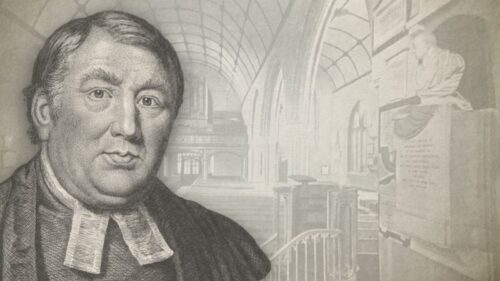
October 10—Morning Devotion
“That ye may know how that the Lord doth put a difference between the Egyptians and Israel.”—Exodus 11:7
Who shall mark down all the properties of distinguishing grace? What a vast difference doth grace make, in this life, between him that serveth God, and him that serveth him not! And what an everlasting difference will be made in the life which is to come. My soul, make this thought the subject of thine unceasing meditation. Thou canst not walk the street, nor go to public worship, nor watch the Lord’s dealings in all the vast and numberless dispensations going on in life, in the wide world of providence and grace, but what every thing speaks, in the language of the morning portion, of the difference there is still put between the Egyptians and Israel. Every thing proclaims it, every event confirms it. And do not overlook the great point of all-it is the Lord that doth all this. “Who maketh thee to differ from another?” Oh for grace to be always on the watch-tower to mark this, and for grace to acknowledge it! Precious Jesus, thou art the Source, the Fountain, the Author, the Finisher, of all. “Oh the depth of the riches both of the wisdom and knowledge of God! How unsearchable are thy judgments, and thy ways past finding out.”
Robert Hawker (1753-1827) was an Anglican (High-Calvinist) preacher who served as Vicar of Charles Church, Plymouth. John Hazelton wrote of him:
“The prominent features…in Robert Hawker's testimony…was the Person of Christ….Dr. Hawker delighted to speak of his Lord as "My most glorious Christ.” What anxious heart but finds at times in the perusal of the doctor's writings a measure of relief, a softening, and a mellowing? an almost imperceptible yet secret and constraining power in leading out of self and off from the misery and bondage of the flesh into a contemplation of the Person and preciousness of Christ as "the chiefest among ten thousand and the altogether lovely." Christ and Him crucified was emphatically the burden of his song and the keynote of his ministry. He preached his last sermon in Charles Church on March 18th, 1827, and on April 6th he died, after being six years curate and forty-three years vicar of the parish. On the last day of his life he repeated a part of Ephesians 1, from the 6th to the 12th verses, and as he proceeded he enlarged on the verses, but dwelt more fully on these words: "To the praise of His glory Who first trusted in Christ." He paused and asked, "Who first trusted in Christ?" And then made this answer: "It was God the Father Who first trusted in Christ."
Robert Hawker on the Biblical Covenants (Complete)
Robert Hawker's Poor Man's Morning Portions





